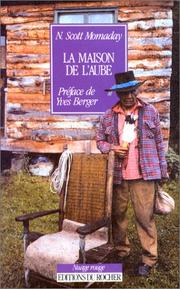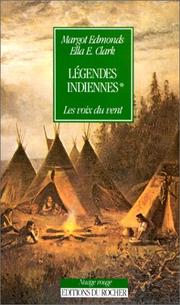| Listing 1 - 10 of 997 | << page >> |
Sort by
|

ISBN: 2268014916 9782268014913 Year: 1993 Publisher: Monaco: Éd. du Rocher,
Abstract | Keywords | Export | Availability | Bookmark
 Loading...
Loading...Choose an application
- Reference Manager
- EndNote
- RefWorks (Direct export to RefWorks)
Book
ISBN: 0660933438 9780660933436 Year: 1991 Publisher: Ottawa: Ministre des approvisionnements et services (Canada),
Abstract | Keywords | Export | Availability | Bookmark
 Loading...
Loading...Choose an application
- Reference Manager
- EndNote
- RefWorks (Direct export to RefWorks)
Book
ISBN: 9782080352569 2080352563 Year: 1996 Publisher: Paris: Flammarion,
Abstract | Keywords | Export | Availability | Bookmark
 Loading...
Loading...Choose an application
- Reference Manager
- EndNote
- RefWorks (Direct export to RefWorks)
Book
ISBN: 2729108084 9782729108083 Year: 1992 Publisher: Paris: Éd. de la Différence,
Abstract | Keywords | Export | Availability | Bookmark
 Loading...
Loading...Choose an application
- Reference Manager
- EndNote
- RefWorks (Direct export to RefWorks)
Book
ISBN: 9782070530618 2070530612 Year: 1988 Publisher: Paris: Gallimard,
Abstract | Keywords | Export | Availability | Bookmark
 Loading...
Loading...Choose an application
- Reference Manager
- EndNote
- RefWorks (Direct export to RefWorks)

ISBN: 2268026361 9782268026367 Year: 1997 Publisher: Monaco: Éd. du Rocher,
Abstract | Keywords | Export | Availability | Bookmark
 Loading...
Loading...Choose an application
- Reference Manager
- EndNote
- RefWorks (Direct export to RefWorks)
Book
ISBN: 9781598536737 Year: 2022 Publisher: New York, NY : Library of America,
Abstract | Keywords | Export | Availability | Bookmark
 Loading...
Loading...Choose an application
- Reference Manager
- EndNote
- RefWorks (Direct export to RefWorks)
For centuries the story of the Pilgrims and the Mayflower has been told and retold--the landing at Plymouth Rock and the first Thanksgiving, and the decades that followed, as the colonists struggled to build an enduring and righteous community in the New World wilderness. But the place where the Plymouth colonists settled was no wilderness: it was Patuxet, in the ancestral homeland of the Wampanoag people, a long-inhabited region of fruitful and sustainable agriculture and well-traveled trade routes, a civilization with deep historical memories and cultural traditions. And while many Americans have sought comfort in the reassuring story of peaceful cross-cultural relations embodied in the myth of the first Thanksgiving, far fewer are aware of the complex history of diplomacy, exchange, and conflict between the Plymouth colonists and Native peoples. Now, Plymouth Colony brings together for the first time fascinating first-hand narratives written by English settlers--Mourt's Relation, the classic account of the colony's first year; Governor William Bradford's masterful Of Plimouth Plantation; Edward Winslow's Good News from New England; the heterodox Thomas Morton's irreverent challenge to Puritanism, New English Canaan; and Mary Rowlandson's landmark "captivity narrative" The Sovereignty and Goodness of God--with a selection of carefully chosen documents (deeds, patents, letters, speeches) that illuminate the intricacies of Anglo-Native encounters, the complex role of Christian Indians, and the legacy of Massasoit, Weetamoo, Metacom ("King Philip"), and other Wampanoag leaders who faced the ongoing incursion into their lands of settlers from across the sea. The interactions of Plymouth Colony and the Wampanoag culminated in the horrors of King Philip's War, a conflict that may have killed seven percent of the total population, Anglo and Native, of New England. While the war led to the end of Plymouth's existence as a separate colony in 1692, it did not extinguish the Wampanoag people, who still live in their ancestral homeland in the twenty-first century.
Book
ISBN: 9780241583821 Year: 2022 Publisher: London : Allen Lane,
Abstract | Keywords | Export | Availability | Bookmark
 Loading...
Loading...Choose an application
- Reference Manager
- EndNote
- RefWorks (Direct export to RefWorks)
Despite the best efforts of researchers and campaigners, there remains today a steadfast tendency to reduce the history of African and Caribbean people in Britain to a simple story: it is one that begins in 1948 with the arrival of a single ship, the Empire Windrush, and continues mostly apart from a distinct British history, overlapping only on occasion amid grotesque injustice or pioneering protest. Yet, as acclaimed historian Hakim Adi demonstrates, from the very beginning, from the moment humans first stood on this rainy isle, there have been African and Caribbean men and women set at Britain's heart. Libyan legionaries patrolled Hadrian's Wall while Rome's first 'African Emperor' died in York. In Elizabethan England, 'Black Tudors' served in the land's most eminent households while intrepid African explorers helped Sir Francis Drake to circumnavigate the globe. And, as Britain became a major colonial and commercial power, it was African and Caribbean people who led the radical struggle for freedom - a struggle which raged throughout the twentieth century and continues today in Black Lives Matter campaigns. Charting a course through British history with an unobscured view of the actions of African and Caribbean people, Adi reveals how much our greatest collective achievements - universal suffrage, our victory over fascism, the forging of the NHS - owe to these men and women, and how, in understanding our history in these terms, we are more able to fully understand our present moment.
Article
Abstract | Keywords | Export | Availability | Bookmark
 Loading...
Loading...Choose an application
- Reference Manager
- EndNote
- RefWorks (Direct export to RefWorks)
Book
ISBN: 2752900228 9782752900227 Year: 2004 Publisher: Paris : Phébus,
Abstract | Keywords | Export | Availability | Bookmark
 Loading...
Loading...Choose an application
- Reference Manager
- EndNote
- RefWorks (Direct export to RefWorks)
| Listing 1 - 10 of 997 | << page >> |
Sort by
|

 Search
Search Feedback
Feedback About UniCat
About UniCat  Help
Help News
News